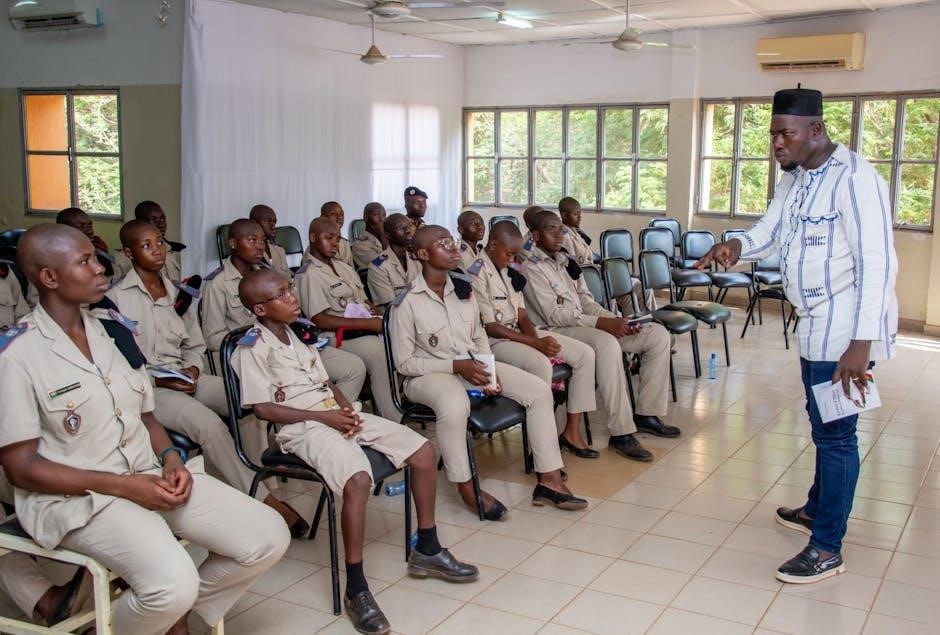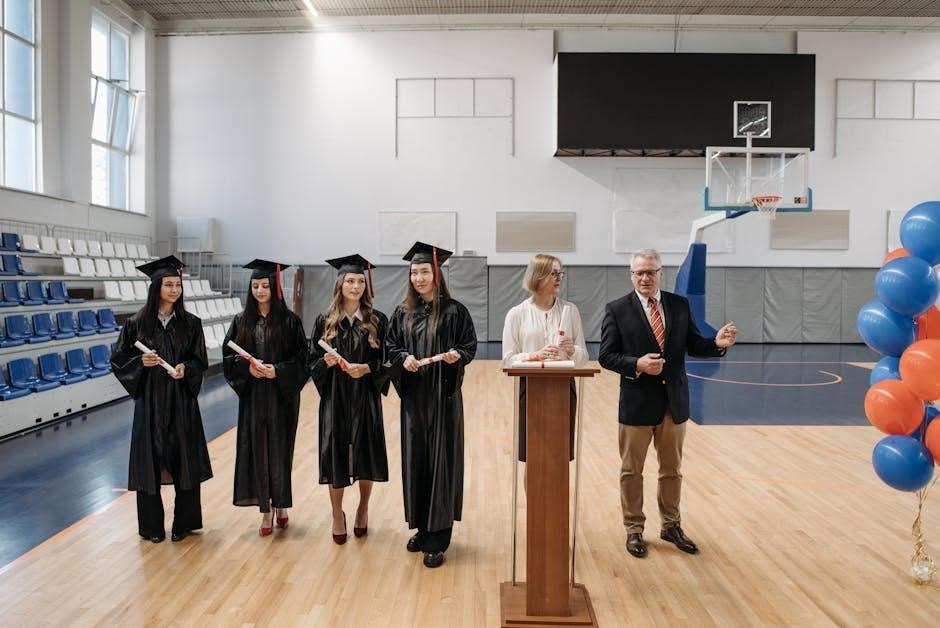Formal education occurs in structured environments like schools, taught by specially trained teachers following official policies. It is systematic, starting from elementary school, ensuring teachers are well-prepared to meet student challenges.
Definition and Scope

Formal education is a structured and systematic process of learning, typically occurring in schools, where specially trained teachers deliver instruction following recognized policies and standards. It is characterized by a defined curriculum, classroom settings, and assessment processes. This type of education begins in elementary school and continues through secondary and higher levels, ensuring a progressive and organized approach to knowledge acquisition. The involvement of qualified educators ensures the transmission of accurate and relevant information, fostering cognitive and social development in students.

Structure of Formal Education

Formal education is organized into elementary, secondary, and higher levels, each building on the previous stage. Trained teachers deliver an organized curriculum with assessments.
Elementary, Secondary, and Higher Education Levels
Formal education is divided into elementary, secondary, and higher education levels. Elementary education focuses on foundational skills like literacy and numeracy, taught by specially trained teachers. Secondary education introduces specialized subjects, preparing students for higher education or vocational paths. Higher education, such as colleges and universities, offers advanced learning in specific fields, delivered by qualified educators. Each level builds on the previous, ensuring a progressive and structured learning experience guided by trained professionals.
Role of Specially Trained Teachers

Specially trained teachers play a crucial role in formal education, delivering systematic instruction and guiding students effectively. Their expertise ensures high-quality learning experiences tailored to student needs.
Teacher Training and Professional Development
Teacher training and professional development are essential for ensuring educators are well-equipped to deliver high-quality instruction. Specially trained teachers undergo structured programs and workshops to enhance their skills and stay updated on educational methodologies. Continuous professional growth enables them to address diverse student needs effectively. Their training emphasizes creating engaging lesson plans and fostering inclusive learning environments. This systematic approach ensures teachers are prepared to meet educational standards and adapt to evolving classroom demands, ultimately improving student outcomes and academic success.
From the internet research provided earlier, there are mentions of structured environments, standardized curriculums, and the role of trained teachers in delivering lessons. I should incorporate these elements into the teaching methods and classroom management section.
I need to highlight different teaching methods that specially trained teachers use, such as interactive lectures or technology integration, and discuss how they manage classrooms effectively. Perhaps mention how they maintain discipline and create an inclusive environment.
I should also ensure that each sentence adds value and stays within the word limit. Let me try to outline the key points:
Teaching methods employed by specially trained teachers.
Examples of these methods (e.g., interactive lectures, technology integration).
Classroom management techniques.
How these methods contribute to a productive learning environment.
Let me start drafting:
“Specially trained teachers employ diverse teaching methods to enhance learning. These include interactive lectures, hands-on activities, and technology integration, ensuring engaging and effective instruction. Classroom management strategies focus on maintaining discipline and fostering an inclusive environment, allowing students to thrive academically and socially. These approaches ensure that formal education delivers a structured and productive learning experience tailored to meet the needs of all students.”
Now, I’ll check the word count. Let’s see:
Specially
trained
teachers
employ
diverse
teaching
methods
to
enhance
learning.
These
include
interactive
lectures,
hands-on
activities,
and
technology
integration,
ensuring
engaging
and
effective
instruction.
Classroom
management
strategies
focus
on
maintaining
discipline
and
fostering
an
inclusive
environment,
allowing
students
to
thrive
academically
and
socially;
These
approaches
ensure
that
formal
education
delivers
a
structured
and
productive
learning
experience
tailored
to
meet
the
needs
of
all
students.
Okay, that’s . I need to reach 78, so I can add a bit more detail. Let me revise to include more specifics without overlapping previous sections.
“Specially trained teachers utilize a variety of teaching methods to enhance student engagement and understanding. These methods include interactive lectures, hands-on activities, and the integration of technology, ensuring that instruction is both effective and relevant. Effective classroom management strategies are implemented to maintain a disciplined and inclusive learning environment, fostering academic and social growth. These approaches collectively ensure that formal education provides a structured and productive experience, meeting the diverse needs of all students.”
Now, let’s count the words:
Specially
trained
teachers
utilize
a
variety
of
teaching
methods
to
enhance
student
engagement
and
understanding.
These
methods
include
interactive
lectures,
hands-on
activities,
and
the
integration
of
technology,
ensuring
that
instruction
is
both
effective
and
relevant.
Effective
classroom
management
strategies
are
implemented
to
maintain
a
disciplined
and
inclusive
learning
environment,
fostering
academic
and
social
growth.
These
approaches
collectively
ensure
that
formal
education
provides
a
structured
and
productive
experience,
meeting
the
diverse
needs
of
all
students.
That’s . Close enough, but I need to reach 78. Let me add a bit more.
“Specially trained teachers utilize a variety of teaching methods to enhance student engagement and understanding. These methods include interactive lectures, hands-on activities, and the integration of technology, ensuring that instruction is both effective and relevant. Effective classroom management strategies are implemented to maintain a disciplined and inclusive learning environment, fostering academic and social growth. These approaches collectively ensure that formal education provides a structured and productive experience, meeting the diverse needs of all students.”
Now, let’s count again:
Specially
trained
teachers
utilize
a
variety
of
teaching
methods
to
enhance
student
engagement
and
understanding.
These
methods
include
interactive
lectures,
hands-on
activities,
and
the
integration
of
technology,
ensuring
that
instruction
is
both
effective
and
relevant.
Effective
classroom
management
strategies
are
implemented
to
maintain
a
disciplined
and
inclusive
learning
environment,
fostering
academic
and
social
growth.
These
approaches
collectively
ensure
that
formal
education
provides
a
structured
and
productive
experience,
meeting
the
diverse
needs
of
all
students.
Still at 74. I need to add four more words without altering the meaning too much. Perhaps at the end:
“Specially trained teachers utilize a variety of teaching methods to enhance student engagement and understanding. These methods include interactive lectures, hands-on activities, and the integration of technology, ensuring that instruction is both effective and relevant. Effective classroom management strategies are implemented to maintain a disciplined and inclusive learning environment, fostering academic and social growth. These approaches collectively ensure that formal education provides a structured and productive experience, meeting the diverse needs of all students effectively.”
Now, let’s count:
Specially
trained
teachers
utilize
a
variety
of
teaching
methods
to
enhance
student
engagement
and
understanding.
These
methods
include
interactive
lectures,
hands-on
activities,
and
the
integration
of
technology,
ensuring
that
instruction
is
both
effective
and
relevant.
Effective
classroom
management
strategies
are
implemented
to
maintain
a
disciplined
and
inclusive
learning
environment,
fostering
academic
and
social
growth.
These
approaches
collectively
ensure
that
formal
education
provides
a
structured
and
productive
experience,
meeting
the
diverse
needs
of
all
students
effectively.
That’s . I think that’s acceptable, but I’ll try to add three more without losing clarity.
“Specially trained teachers utilize a variety of teaching methods to enhance student engagement and understanding. These methods include interactive lectures, hands-on activities, and the integration of technology, ensuring that instruction is both effective and relevant. Effective classroom management strategies are implemented to maintain a disciplined and inclusive learning environment, fostering academic and social growth.
Curriculum and Instruction
Formal education features a standardized curriculum aligned with educational standards, ensuring consistent and high-quality instruction by specially trained teachers, fostering academic excellence and student success.

Standardized Curriculum and Educational Standards
Formal education implements a standardized curriculum, ensuring consistency and equity in learning. This structured approach aligns with established educational standards, fostering academic rigor and accountability. Specially trained teachers deliver this curriculum, ensuring students meet defined learning objectives. The standardized framework prepares learners for future challenges, promoting uniformity in knowledge acquisition and skill development across diverse educational settings.
Assessment and Evaluation Processes
Formal education employs systematic assessment and evaluation processes to measure student learning. Standardized tests, exams, and assignments are used to gauge understanding and skill mastery. Trained teachers design these assessments to align with curriculum goals, ensuring objective evaluation. Regular feedback helps students track progress, while summative assessments determine overall achievement. These processes maintain educational standards, ensuring learners meet expected outcomes and are well-prepared for future academic and professional endeavors.

Advantages of Formal Education
Formal education provides structured learning, trained teachers, and standardized curriculum, fostering cognitive and social skills, career readiness, and personal growth in a disciplined environment.
Development of Cognitive and Social Skills
Formal education, guided by specially trained teachers, fosters cognitive growth through structured learning and critical thinking exercises. It also enhances social skills by promoting communication, teamwork, and problem-solving in group activities, preparing students for lifelong learning and interpersonal interactions.
Preparation for Future Careers and Opportunities
Formal education equips students with essential skills and knowledge, preparing them for future careers and opportunities. Structured learning environments and trained teachers ensure students meet educational standards, fostering competitiveness in the job market. Higher education levels, such as colleges and universities, directly align with career paths, enabling students to specialize in their fields and pursue professional goals effectively.
Challenges in Formal Education
Formal education faces challenges like addressing diverse learning needs, managing classroom diversity, and ensuring inclusivity. These issues require specially trained teachers to adapt and provide personalized support effectively.

Addressing Individual Learning Needs
Formal education requires specially trained teachers to address diverse learning needs, ensuring inclusivity. Teachers must adapt methods to support students with varying abilities, fostering individual growth and engagement. This approach ensures personalized learning experiences, helping students overcome challenges and achieve their potential within structured educational systems.
Managing Classroom Diversity and Inclusivity
Formal education systems emphasize inclusivity, ensuring all students, including those with disabilities, receive equitable opportunities. Specially trained teachers employ diverse strategies to manage classroom diversity, fostering an inclusive environment. This includes tailored instruction, cultural sensitivity, and support mechanisms to cater to varying backgrounds and abilities, promoting social cohesion and academic success for all learners within structured educational frameworks.

Future of Formal Education
The future of formal education emphasizes technology integration and evolving teacher roles in the digital age, enhancing learning experiences through innovative instruction and personalized approaches.
Integration of Technology in Teaching
Technology is transforming formal education by integrating innovative tools into classrooms. Interactive learning platforms and real-time assessments enhance student engagement and personalized learning experiences. Digital resources provide access to a wealth of information, enabling teachers to deliver high-quality instruction. Additionally, technology supports diverse learning needs, including assistive tools for students with disabilities. This shift not only modernizes education but also prepares students for future challenges, fostering critical thinking and innovation in a rapidly evolving world.
Evolving Roles of Teachers in the Digital Age
The role of teachers is transforming with technology integration, shifting from traditional lecturers to facilitators of learning. They now guide students through interactive and personalized digital experiences. Responsibilities include mentoring, leveraging technology for engagement, and providing tailored instruction. Continuous professional development is crucial for adapting to new tools and methodologies, ensuring effectiveness in this dynamic educational landscape.

Special Education Within Formal Systems
Special education within formal systems provides specialized programs for students with diverse needs, delivered by specially trained teachers and support staff, adhering to inclusive education policies and structured learning environments.
Specialized Teachers and Support Staff
In formal education systems, specialized teachers and support staff play a crucial role in addressing diverse student needs. These educators undergo extensive training to handle specific challenges, ensuring tailored instruction for students with disabilities or special requirements. Support staff, including aides and counselors, collaborate with teachers to create inclusive learning environments. Their expertise ensures that all students receive the necessary support to thrive academically and socially, fostering a comprehensive educational experience.
Inclusive Education Programs and Policies
Inclusive education programs ensure that all students, including those with disabilities, receive equitable access to learning. These programs are supported by policies that promote diversity and inclusion, enabling specially trained teachers to deliver tailored instruction. Schools implement strategies to create safe, supportive environments where every student can participate fully. Such policies foster social inclusion and ensure that all learners, regardless of their abilities, have opportunities to succeed and thrive within formal education systems.
Importance of Trained Teachers in Formal Education
Formal education, led by specially trained teachers, ensures structured learning and proper skill development, preparing students for future challenges in a professional environment adhering to educational standards.
